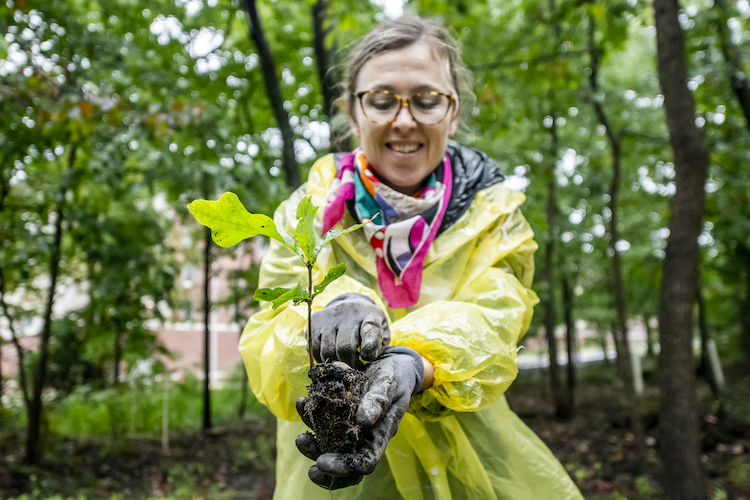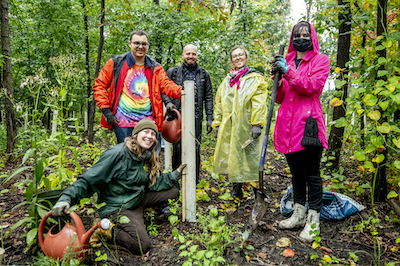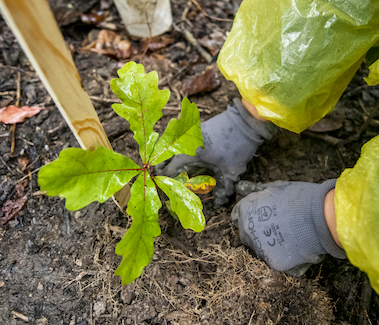
Artist Katie Kehoe wants to make a difference—100 trees at a time.
Kehoe is one of seven members of the Atlantika Collective, whose artwork was displayed at Mason Exhibitions Arlington this fall in the show Approaching Event Horizons: Projects on Climate Change.
Her work, a series of animated photographs that reveal the ecological emergency of wildfires titled Superimpositions: Wildfires in My Landscape, was inspired by the media coverage of many forest fires and the impact they have had on the environment.
Kehoe met with Mason’s Greenhouse and Gardens sustainability program manager Doni Nolan via Zoom to discuss the final part of her exhibit—an afforestation project across Mason’s Fairfax Campus.
“She needed spaces to plant the trees where they could thrive and be protected for the duration of their lives,” said Nolan. “I often help students with these types of projects, so [University Curator Don Russell] connected her with me.”
Kehoe received funding from Mason’s Patriot Green Fund to purchase the trees, fertilizer, mulch and supplies.
On Saturday, October 1, in collaboration with the Office of Sustainability, Facilities Management, Green Studio, and Mason Exhibitions, Kehoe, Nolan and a group of volunteers planted 100 native trees on parts of the Fairfax Campus.

“All of us working together,” Kehoe said, “people have been sharing their expertise to guide me and helped me refine the plan for this project so that everyone feels committed to it, invested in it and like it represents their needs.”
Kehoe’s objective with this project is to speak about the urgency of climate change and how it’s affecting our forests, she said. This is the second part of a project that Kehoe led in Nova Scotia, Canada, last summer where she planted 100 trees native to the area.
“Forests are critical because trees store carbon and when forests burn, especially old growth forests, it releases carbon, which actually hastens climate change,” she explained. “It’s really devastating to see the sheer number of fires and a lot of the old growth forests getting burned and I had to acknowledge that.”
Kehoe wants to motivate her audience and to provide people with knowledge of where to start. “We all know how to plant trees now,” she said. “I’m sure there are going to be more trees planted out of inspiration from this event, so that for me is next level in my art practice.”

“As an artist myself, I really appreciated how Katie brought the soul of the trees to the event,” said Nolan, who is working on a PhD in biosciences at Mason. “A couple years ago, Mason was accredited as an arboretum for the trees on campus. I'm hoping that the trees from this planting event will be added to our collection.”
After planting trees at Mason, Kehoe wants to continue her afforestation efforts.
“I’m thinking of this as the beginning of larger projects that’re always going to be titled ‘100 Trees,’” Kehoe said. “I want to work with other organizations and educational institutions to host events of this nature that involve planting 100 native trees on sites around the country so that we keep adding trees to the landscape. Maybe we'll get to 1,000, maybe we’ll get to 100,000.”
Anyone can view Mason’s Arboretum collection and look at the map of where certain trees are located. There are also signs physically near the trees where people walking by can scan a QR code and read about the tree.
